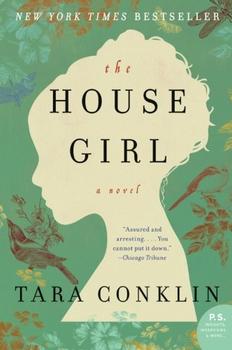Book Club Discussion Questions
Want to participate in our book club? Join BookBrowse and get free books to discuss!
Please be aware that this discussion guide will contain spoilers!
- As a servant in the Bell's home Josephine is literally "The House Girl." But how does this title also apply to Lina's character? What is the significance of Lina leaving her father's house at the close of the story?
- The definition of "family" is unclear in this story: Lina's mother is absent for all of her life, Josephine's son is fathered by her married master. As Lina reflects on her mother's artwork she wonders whether you can create family connections: "What is blood and what is decision?" What is your response?
- Separated by more than two centuries, Lina and Josephine's characters never meet, but Conklin's narrator tells this story through each of their perspectives. What similarities do you find between these two women? What would each character be able to teach the other?
- On an empty page in her favorite book, Grace Sparrow writes "who is free?" We know that Josephine, Lottie and the others at the Bell plantation are literally enslaved. But who else experiences a lack of freedom in this story? Do you think these characters achieve freedom by the close of the novel?
- Lu Anne Bell's relationship to Josephine is intense. She allows this slave, who gave birth to a boy fathered by her own husband, to remain in their home. She shares the most intimate moments of vulnerability with her when her illness is at its worst. But how does Josephine feel towards Lu Anne? How does she perceive her role in Lu Anne's life?
- Taking us back and forth between Josephine and Lina's worlds, the narrator gives us an intimate look into the lives of both women. But Conklin also introduces Caleb Harper and Dorothea Rounds as additional narrators, speaking through their letters. What did their narrations add to the story? How did they change your understanding of Josephine and others living and working in the Bell's community?
- Josephine "keeps" her memories in Mr. Jefferson's chest of drawers. How is this similar to Oscar's paintings of Grace? How do these characters confront the loss and pain they've experienced? How do they hide things away?
- In the final pages of the novel, Lina decides to call her mother, asking Jasper to dial the phone number. What do you think Lina will say? Is she ready to build a relationship? Has she forgiven her mother for leaving?
- Many people ask Lina why she has chosen to become a lawyer. Does she ever give a satisfying answer? Lina's law professor had taught her that the "law is the bastion of reason…there is no place for feeling." Why does a career like this appeal to Lina, the artist's daughter? How does this appeal wane throughout the story?
- Many of the characters are trying to atone for acts committed in the past—Caleb, for his work with the slavecatcher, Dorothea for her brother Percy's death, Oscar for not being a "good husband" to Grace. Do you think they are successful?
- What is the role of religion in Josephine's world? How does religious belief both help and hinder Lottie?
- Lina and Dorothea are both women seeking to excel in areas dominated by men—Lina, at a corporate law firm; Dorothea, in the abolitionist movement, what her father calls "not work for women." How do their experiences differ? How are they the same?
Unless otherwise stated, this discussion guide is reprinted with the permission of William Morrow.
Any page references refer to a USA edition of the book, usually the trade paperback version, and may vary in other editions.




